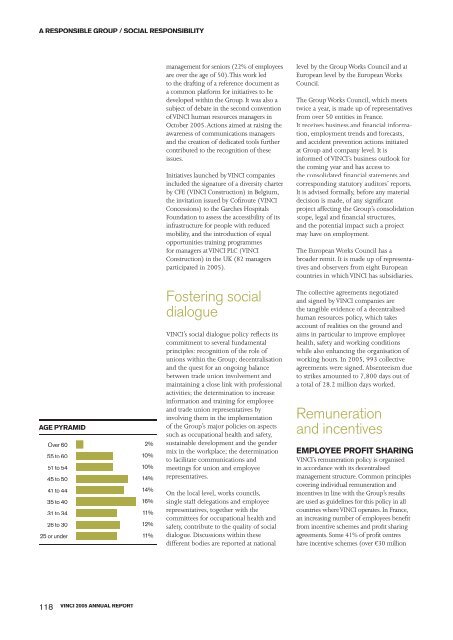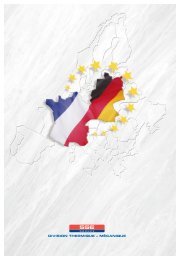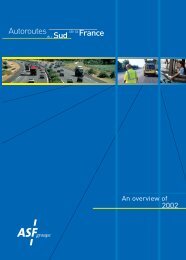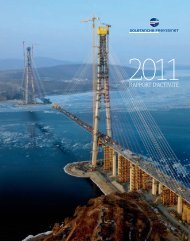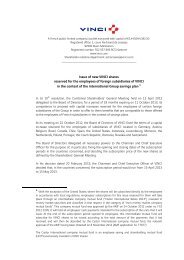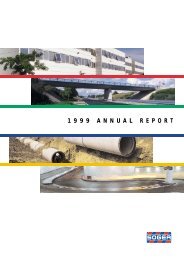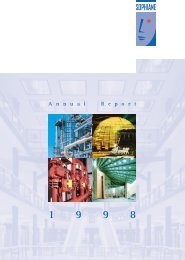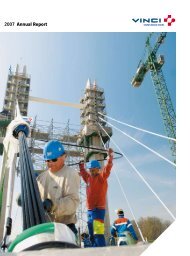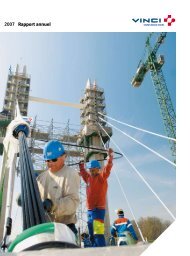VINCI - 2005 annual report
VINCI - 2005 annual report
VINCI - 2005 annual report
You also want an ePaper? Increase the reach of your titles
YUMPU automatically turns print PDFs into web optimized ePapers that Google loves.
A RESPONSIBLE GROUP / SOCIAL RESPONSIBILITY<br />
AGE PYRAMID<br />
118<br />
Over 60<br />
55 to 60<br />
51 to 54<br />
45 to 50<br />
41 to 44<br />
35 to 40<br />
31 to 34<br />
26 to 30<br />
25 or under<br />
<strong>VINCI</strong> <strong>2005</strong> ANNUAL REPORT<br />
2%<br />
10%<br />
10%<br />
14%<br />
14%<br />
16%<br />
11%<br />
12%<br />
11%<br />
management for seniors (22% of employees<br />
are over the age of 50). This work led<br />
to the drafting of a reference document as<br />
a common platform for initiatives to be<br />
developed within the Group. It was also a<br />
subject of debate in the second convention<br />
of <strong>VINCI</strong> human resources managers in<br />
October <strong>2005</strong>. Actions aimed at raising the<br />
awareness of communications managers<br />
and the creation of dedicated tools further<br />
contributed to the recognition of these<br />
issues.<br />
Initiatives launched by <strong>VINCI</strong> companies<br />
included the signature of a diversity charter<br />
by CFE (<strong>VINCI</strong> Construction) in Belgium,<br />
the invitation issued by Cofi route (<strong>VINCI</strong><br />
Concessions) to the Garches Hospitals<br />
Foundation to assess the accessibility of its<br />
infrastructure for people with reduced<br />
mobility, and the introduction of equal<br />
opportunities training programmes<br />
for managers at <strong>VINCI</strong> PLC (<strong>VINCI</strong><br />
Construction) in the UK (82 managers<br />
participated in <strong>2005</strong>).<br />
Fostering social<br />
dialogue<br />
<strong>VINCI</strong>’s social dialogue policy refl ects its<br />
commitment to several fundamental<br />
principles: recognition of the role of<br />
unions within the Group; decentralisation<br />
and the quest for an ongoing balance<br />
between trade union involvement and<br />
maintaining a close link with professional<br />
activities; the determination to increase<br />
information and training for employee<br />
and trade union representatives by<br />
involving them in the implementation<br />
of the Group’s major policies on aspects<br />
such as occupational health and safety,<br />
sustainable development and the gender<br />
mix in the workplace; the determination<br />
to facilitate communications and<br />
meetings for union and employee<br />
representatives.<br />
On the local level, works councils,<br />
single staff delegations and employee<br />
representatives, together with the<br />
committees for occupational health and<br />
safety, contribute to the quality of social<br />
dialogue. Discussions within these<br />
different bodies are <strong>report</strong>ed at national<br />
level by the Group Works Council and at<br />
European level by the European Works<br />
Council.<br />
The Group Works Council, which meets<br />
twice a year, is made up of representatives<br />
from over 50 entities in France.<br />
It receives business and fi nancial information,<br />
employment trends and forecasts,<br />
and accident prevention actions initiated<br />
at Group and company level. It is<br />
informed of <strong>VINCI</strong>’s business outlook for<br />
the coming year and has access to<br />
the consolidated fi nancial statements and<br />
corresponding statutory auditors’ <strong>report</strong>s.<br />
It is advised formally, before any material<br />
decision is made, of any signifi cant<br />
project affecting the Group’s consolidation<br />
scope, legal and fi nancial structures,<br />
and the potential impact such a project<br />
may have on employment.<br />
The European Works Council has a<br />
broader remit. It is made up of representatives<br />
and observers from eight European<br />
countries in which <strong>VINCI</strong> has subsidiaries.<br />
The collective agreements negotiated<br />
and signed by <strong>VINCI</strong> companies are<br />
the tangible evidence of a decentralised<br />
human resources policy, which takes<br />
account of realities on the ground and<br />
aims in particular to improve employee<br />
health, safety and working conditions<br />
while also enhancing the organisation of<br />
working hours. In <strong>2005</strong>, 993 collective<br />
agreements were signed. Absenteeism due<br />
to strikes amounted to 7,800 days out of<br />
a total of 28.2 million days worked.<br />
Remuneration<br />
and incentives<br />
EMPLOYEE PROFIT SHARING<br />
<strong>VINCI</strong>’s remuneration policy is organised<br />
in accordance with its decentralised<br />
management structure. Common principles<br />
covering individual remuneration and<br />
incentives in line with the Group’s results<br />
are used as guidelines for this policy in all<br />
countries where <strong>VINCI</strong> operates. In France,<br />
an increasing number of employees benefi t<br />
from incentive schemes and profi t sharing<br />
agreements. Some 41% of profi t centres<br />
have incentive schemes (over €30 million


